
Index funds are a type of mutual or exchange-traded fund (ETF) that tracks the performance of a market index, such as the S&P 500, by holding the same stocks or bonds or a representative sample of them. They are a low-cost, easy way to build wealth, and they often perform better than actively managed funds over the long term. Index funds are also less expensive and typically carry less risk than individual stocks.
Index funds are passively managed, meaning they don't require active decision-making about which investments to buy or sell. This passive management strategy means that index funds are considered less volatile than individual stocks, making them a more stable investment choice.
When investing in index funds, it is important to consider factors such as the fund's performance history, management fees, the index it tracks, and the associated costs and risks. By choosing index funds with low expense ratios and strong long-term performance, investors can maximize their returns while minimizing costs.
| Characteristics | Values |
|---|---|
| Type of fund | Mutual fund or exchange-traded fund (ETF) |
| Investment strategy | Passive |
| Investment objective | To replicate the performance of a specific market index |
| Costs | Expense ratio, sales load, trading costs |
| Returns | Historical performance varies but over the long term, many index funds have outperformed actively managed funds |
| Risk | Lower risk due to diversification but still subject to market swings |
| Investment minimum | Varies by fund and broker; some ETFs have no minimum investment amount |
| Tax efficiency | More tax-efficient than actively managed funds due to lower turnover rates |
What You'll Learn

What is an index fund?
An index fund is an investment fund that tracks the performance of a specific market index, such as the S&P 500, by holding the same stocks or bonds or a representative sample of them. It is considered a passive investment strategy as it does not involve actively picking securities or timing the market. Index funds are available as either mutual funds or exchange-traded funds (ETFs).
Index funds are defined as investments that mirror the performance of benchmarks like the S&P 500 by mimicking their makeup. These funds are passively managed, meaning they do not have teams of analysts and portfolio managers trying to beat the market. As a result, they have lower fees and expenses than actively managed funds. The fund's manager simply buys all or a representative sample of the stocks or bonds in the index it tracks.
Index funds are popular among investors because they offer a simple, low-cost way to gain exposure to a broad, diversified portfolio. They are ideal for long-term investing, such as retirement accounts, and are designed to replicate the performance of financial market indexes.
When investing in index funds, it is important to consider factors such as the fund's expenses, taxes, investment minimums, and trading costs. Additionally, it is crucial to understand the fund's performance over the long term, ideally over five to ten years, to gauge potential future returns.
Overall, index funds offer investors a way to own a diverse collection of stocks at a low cost while enjoying the benefits of diversification and reduced risk.
Hedge Fund Investment Strategies: Where and How They Invest
You may want to see also

How to invest in index funds
Index funds are a low-cost, easy way to build wealth. They are a group of stocks that mirror the performance of an existing stock market index, such as the Standard & Poor's 500 index. Index funds don't try to beat the market but instead aim to be the market by buying stocks of every firm listed on a market index.
- Have a goal: Know what you want your money to do for you. If you're looking to make a lot of money quickly, you may be more interested in individual stocks or cryptocurrencies. However, if you're looking to grow your money slowly over time, index funds may be a great option.
- Research index funds: Look at the different types of index funds available, such as those that track small, medium, or large companies, or those that focus on specific sectors or international markets.
- Pick your index funds: Consider the costs associated with the index fund. Index funds are cheap to run because they are automated, but they still carry administrative costs that can vary, so be sure to compare these.
- Decide where to buy your index funds: You can purchase index funds directly from a mutual fund company or a brokerage. When deciding where to buy, consider factors such as fund selection, convenience, trading costs, and commission-free options.
- Buy index fund shares: You can open a brokerage account or an account directly with a mutual fund company to buy shares of the index fund.
- Keep an eye on your index funds: While index funds are considered passive investments, it's important to periodically check in on their performance and make any necessary adjustments.
- Index funds typically carry less risk than individual stocks.
- Index funds are less expensive than actively managed funds.
- Index funds are tax-efficient compared to many other investments.
- It's important to understand your investment goals and choose an index fund that aligns with your risk tolerance and return expectations.
- You can purchase index funds in various investment accounts, such as a brokerage account, IRA, HSA, or 401(k).
- Some popular indexes to consider include the S&P 500, Dow Jones Industrial Average, Nasdaq Composite, and Russell 2000.
By following these steps and considerations, you can effectively invest in index funds and build your wealth over time.
Singapore's Sovereign Wealth: Where Does the City-State Invest?
You may want to see also

Advantages and disadvantages of index funds
Index funds are a passive investment method, meaning they don't require active management. They are a low-cost, easy way to build wealth, and are ideal for beginners with little financial knowledge. They are also a great choice for those who want to minimise the time and money spent on investing.
Advantages
- Low cost: Index funds have lower management fees than actively managed funds because they take a passive approach to tracking an index.
- Requires little financial knowledge: Index investing is relatively easy compared to building your own portfolio.
- Convenience: Index funds contain hundreds of stocks that would be hard to replicate at an individual level.
- Diversification: Holding a large array of stocks diversifies away idiosyncratic (firm-specific) risk.
- Better returns: Index funds tend to perform better than actively managed funds over the long term.
- Tax efficiency: Index funds are tax-efficient compared to actively managed funds because they don't do as much buying and selling, so they avoid generating capital gains that can add to your tax bill.
- Predictable long-term returns: Index funds promise stable returns in the long term. For example, the S&P 500 earned approximately 10% in average annual returns over 90 years.
Disadvantages
- No chance of beating the market: Index funds are designed to match the market's performance, so they cannot beat it.
- Short-term downside risk: Index funds can be volatile places to put your money, especially when the economy or stock market is performing poorly.
- Lack of choice: You might have a say in the types of businesses and industries you invest in, but you cannot pick the companies in the fund.
- Lack of downside protection: There is no floor to losses in index funds.
- Lack of flexibility: Index funds are limited to well-established investment styles and sectors.
- High minimum investment: Some index funds demand sizable starting investments of between $1,000 and $10,000.
Why Investment Funds Need Broker-Dealers: A Strategic Partnership
You may want to see also

Index mutual funds vs. index ETFs
Index mutual funds and index ETFs are both passive investment vehicles that track an underlying index. Here are some key differences and considerations to help you decide which option may be more suitable for your investment needs:
Trading Approach:
- Index Mutual Funds: These funds are bought and sold at the price set at the end of the trading day, similar to traditional mutual funds. They are suitable for long-term investors who don't need intraday trading capabilities.
- Index ETFs: Exchange-Traded Funds (ETFs) can be traded throughout the day like stocks, making them more suitable for investors who want the flexibility to buy and sell during market hours.
Liquidity:
- Index Mutual Funds: They are less liquid compared to ETFs since they are bought and sold like traditional mutual funds, and the fund house has to honour the buy and sell orders.
- Index ETFs: ETFs tend to be more liquid as they are traded on secondary markets, allowing investors to buy and sell during market hours. However, it's important to consider the liquidity of specific ETFs, as some may have low trading volumes, impacting your ability to buy or sell large quantities.
Minimum Investment:
- Index Mutual Funds: They often have higher minimum investment requirements set by the mutual fund provider, which may be higher than the typical share price.
- Index ETFs: ETFs usually have lower minimum investments, sometimes as low as the cost of a single share, or even fractional shares offered by some brokers.
Tax Efficiency:
- Index Mutual Funds: They can trigger capital gains taxes in two ways. First, when the fund is sold for a higher price than the purchase price, and second, when the fund sells holdings to meet redemption requests, passing on capital gains to all investors.
- Index ETFs: They are generally more tax-efficient because when you sell an ETF, you're selling it directly to another investor, and the capital gains taxes are yours alone to pay.
Costs:
- Index Mutual Funds: They may have slightly higher expense ratios compared to ETFs, but it's important to compare the specific funds as costs can vary. Mutual funds may also have transaction fees when buying or selling.
- Index ETFs: While ETFs often have lower expense ratios, keep in mind the additional costs such as trading commissions and the bid-ask spread when buying and selling.
Suitability for Different Investor Types:
- Index Mutual Funds: These are suitable for truly passive investors who want to achieve optimal asset allocation with minimal activity and adjustments through regular rebalancing.
- Index ETFs: ETFs cater to investors who want a more active approach to indexing and desire greater flexibility and speed in implementing tactical changes in their portfolios.
In conclusion, the choice between index mutual funds and index ETFs depends on your investment goals, time horizon, level of sophistication, and comfort with managing a trading account. Both options offer diversification, low costs, and strong long-term returns, but they differ in terms of trading flexibility, liquidity, minimum investment requirements, tax efficiency, and costs.
Socially Responsible Funds: Where to Invest Your Money?
You may want to see also

Best index funds to invest in
Index funds are a passive investment that tracks a specific collection of assets called an index. The index can include stocks, bonds and other assets, including commodities such as gold. The most well-known index is the Standard & Poor's 500 index (S&P 500), which includes about 500 of the largest publicly traded American companies. Other popular indexes include the Nasdaq Composite, the Dow Jones Industrial Average and the Russell 2000.
Index funds are a great investment for building wealth over the long term. That's one reason they're popular with retirement investors. They are also less expensive than actively managed funds, and typically carry less risk than individual stocks.
Vanguard S&P 500 ETF
The Vanguard S&P 500 ETF is one of the largest index funds in the world. It tracks the benchmark S&P 500 index, which is widely regarded as the best overall representation of the stock market. The expense ratio is 0.03%, meaning you would pay $3 annually for every $10,000 invested.
Vanguard Total Stock Market
This fund tracks an index of US stocks of all sizes. It has an expense ratio of 0.03%, so you would pay $3 annually for every $10,000 invested.
Vanguard Total International Stock Market
This fund tracks an index of global stocks, excluding the US. It has a slightly higher expense ratio of 0.076%, so you would pay $7 annually for every $10,000 invested.
Vanguard Total Bond
This fund tracks an index of various bonds and has an expense ratio of 0.03%, so you would pay $3 annually for every $10,000 invested.
Fidelity ZERO Large Cap Index
The Fidelity ZERO Large Cap Index fund does not officially track the S&P 500, but instead follows the Fidelity US Large Cap Index. However, the difference is minimal. The main advantage of this fund is that it has an expense ratio of 0%, so you would pay nothing annually for every $10,000 invested.
SPDR S&P 500 ETF Trust
The SPDR S&P 500 ETF is one of the oldest ETFs, having been founded in 1993. It helped kick off the wave of ETF investing. It has an expense ratio of 0.095%, so you would pay $9.50 annually for every $10,000 invested.
IShares Core S&P 500 ETF
The iShares Core S&P 500 ETF is sponsored by BlackRock, one of the largest fund companies. It has an expense ratio of 0.03%, so you would pay $3 annually for every $10,000 invested.
Schwab S&P 500 Index Fund
This fund is sponsored by Charles Schwab, one of the most respected names in the industry. It has a very low expense ratio of just 0.02%, so you would pay $2 annually for every $10,000 invested.
Mutual Fund Investors: Owners of a Diverse Portfolio
You may want to see also







